#rammstein interview
Text
'Reportatge Rammstein a Sputnik del Canal 33 (1997)'
youtube
Flake being Flake (but in english 😊) and Olli standing by, okay with having Flake do the talking 😊
49 notes
·
View notes
Text
dailymotion
The fact that I can understand this mumbling monkey better than I can understand Richard Kruspe.....
#old interview#I do hope his english has improved but with an austrian wife...I doubt it#I do ship him and his wife though and I crush on them both#also fic inspo for the mumbling bit haha#christoph schneider#schnoodle#christoph schnoodle#mumbling schnitzel#rammstein interview#schneider#rammstein
21 notes
·
View notes
Note
Hi, I'm Richard Zee Kay from Rammstein and Emigrate 🖤💅❤️🎸🧛♂️🚬🇩🇪
He is Richard 🚬 Zee 🖤 Kay 🤌🏻 and surely is...a lot sometimes 😌
Found this video of several unhinged snippets from his interviews and while this of course is just one aspect of this wonderful man, it really is iconic what Richard Zee Kay throws at innocent listeners sometimes 👀
Credits to the sweet tillka over on Tiktok 🫶🏻
#“...da ist man einfach platt 😀😀”#ja bin ich auch meist nachdem ich 20 deiner Interviews gesichtet habe du Labertasche#but nothing other than love for this man and his sometimes slightly overwhelming self 🫶🏻#still Traummann. forever and always#rammstein#richard kruspe#ask#this ask was in my inbox for AGES#glad i finally got to use it for something
77 notes
·
View notes
Text
käärijä being the biggest rammstein fan: a compilation
#i'm collecting videos of him talking about r+ like infinity stones#jere loving one of my all time favourite bands is something that can actually be so personal#anyway i'm still laughing about him recommending bück dich (LIVE version) to that poor interviewer... honey you've got a big storm coming#and i'm still emo about schneider commenting under one of his posts RAMMSTEIN × KÄÄRIJÄ COLAB WHEN#käärijä#jere pöyhönen#rammstein
338 notes
·
View notes
Text
Interviewer: „Und ich glaube auch, dass euer Drummer richtig stolz darauf ist, wie er so rüberkommt, oder?“
Stille
Interviewer: „Na, er trägt auf jedem Foto ne ziemlich schwere Frau …“ Gelächter „… so leicht, als wäre sie ne Feder …“ mehr Gelächter „… und hat wahnsinnig viele Muskeln, oder?“
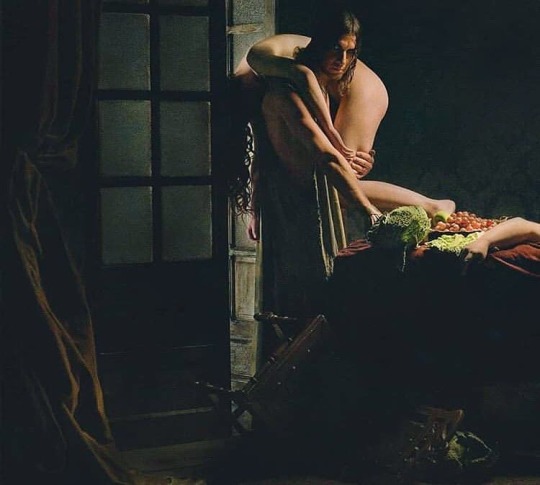
Paul: „Ja, Schneider ist ein ganz Starker. Muss er ja, weil er Schlagzeug spielt. Wir können ja so gemütlich auf der Bühne rumstehen und der muss jedes Mal ganz doll raufschlagen als ob es das letzte Mal ist.“
*****************
Interviewer: “And I also believe that your drummer is really proud of how he comes across, right?”
Silence
Interviewer: ”Well, in every photo he carries a fairly heavy woman … “ laughter “… as easy as if she was a feather …” more Laughter “… and has an incredible amount of muscles, right?”
Paul: “Yes, Schneider is very strong. He has to because he plays drums. We can stand around on stage and chill and he always has to hit the drums so hard as if it is the last time.”
70 notes
·
View notes
Text
Metal Hammer - June 2019
Interview with Paul, Schneider, Flake and Richard
How did you motivate yourselves to record an album again after the long absence from the studio?
Richard: It wasn't that easy. If we want to go into the studio or write an album, it can't be done within a few weeks. That's why we always think very carefully about whether we really have the strength and stamina to do it. At the end of the day, you never know where we'll end up. It's always an adventure with us! In 2015, the idea of making a new album came up for the first time. I really didn't feel like doing it at the time because I thought it would involve a lot of controversy. But then we pulled ourselves together and said: Let's try to take all the pressure off. We are free from any contracts, our own masters. So let's just have a look. We start rehearsing and then when we have three or four songs that are okay, we put them out. And if we are not satisfied, we let it be completely.
Schneider: I understand the fans who might be annoyed after the long wait. But we need the time to be really good. That is always our aim: to get the maximum out of every note. Sometimes it's just a few percentage points that we improve within weeks, but they make the difference. But it's not easy: I wasn't always sure whether this record would actually exist. We have now spent three years in the rehearsal room and in the studio. The nice thing about it: In no other phase of the band's history have we understood each other as well as we do now, didn't yell at each other at work and thus survived musical crises.
Paul: But honestly, if I had known beforehand what kind of process this was going to be, phew my god. (Laughs) There really is a lot of blood, sweat and tears, anger and stress in this album.
You have decided to go new ways for the recordings. How did that happen?
Richard: We just wanted to try something new. And also in the way we produce — first we went to France with Tom Talget and Olsen Involtini instead of Jacob Hellner and Stefan Glaumann as before. Change is always a fragile thing: On the one hand, you don't want to change what you're successful with. On the other hand, you have the desire to develop as a musician. We then decided to leave our comfort zone. That didn't go smoothly either, at first we didn't really get along with Tom and Olsen. And Jacob Hellner has been a father figure in a way; someone who properly directs a production. Olsen doesn't do that and Tom doesn't do that. For me it felt like: Nobody knows where we should go anymore... Here you realize again: Astrologically speaking, Rammstein is fire, water and earth at the same time. What we lack is air, i.e. lightness. We tried to get air in. Olsen Involtini is such an aerial person.
Schneider: He managed to lead us through the difficult development phases of the album. We often have deadlocks: three of us are for one solution, three for the other. Then we just didn't continue, one idea fell by the wayside. That's where Olsen came in — he was in charge as producer, and you can feel that in the songs. Through him we came to new inspirations that we would not have found on our own.
Paul: This development was very important for us. We didn't want to make another album without challenges. We were about doing it differently just to do it differently. With Jacob it was like with a teacher on a school trip. The longer we were on the road, the more respect for each other dwindled. I love trying something where you don't know at the beginning what it will be like at the end. So it was a good idea for Richard to involve Olsen. When we have someone we accept—and that's not always easy for us—then it feels good to hear an informed opinion. With the six of us, everything is always very uncoordinated.
Did these new paths also encourage your creativity?
Schneider: On this album, I played my instrument very slowly in order to get involved in a way that served the respective song. It wasn't important to me to show what I can do — I only play what's really required on the album.
Richard, did you feel that ideas you brought up were more readily accepted by others?
Richard: Nah, I felt like my ideas were being viewed extremely critically. Of course, that's also because I've tried to push certain things through in the past. That sticks. Because I work a lot, there is sometimes hardly any space for the others. In addition, I have to make a sound. This time I worked with Till on some ideas and then brought finished demos to our meetings. But they were also picked apart, of course.
Is Till your first point of contact within the band?
Richard: It depends. He's hard to get hold of at times, then the others come into play first.
So in your case primarily Paul?
Richard: It used to be that Paul and I thought completely differently. Simply because we are different types. This time we often agreed. There was a change between me and Paul, which I find incredibly refreshing and also very productive. I don't even know how it happened that there wasn't any competition in the songwriting phase this time... Maybe because I thought: «Hey, if this is a good idea, it will eventually catch on. And if not, I'll take them to another project. » That worked for the most part, and it gave me a certain balance.
Paul: We had quite a long time off, after the break we got closer again. With an undertaking as intensive as Rammstein, you have to take a break from time to time, otherwise you'll eventually become stupid in the head. Richard and I first had to learn, in a creative sense, to be in one room again — Schneider helped us a lot with that.
But aren't you really good when you can rub each other?
Richard: Yes, that's true for me. But that meant that no one could stand me anymore. Lots of loneliness. I've learned. Whenever I thought it wouldn't work anymore, now I really have to say something, I consciously withdrew.
Have you ever thought about not continuing?
Richard: Of course! 100 times! Played through in any form... I'm definitely only doing Rammstein because I really want to. And I can still take the time to do other projects. They are and were very important to me. I probably wouldn't have survived without it. I recently asked myself the question: "What else should happen in my life?" I am a person who loves challenges. And, yes, Rammstein isn't everything in my life. It shouldn't be everything.
How do the others think about it?
Flake: I noticed that I can do something at Rammstein that I couldn't do in another world, I would never quit there. It's not even important to me that I play. I could just drive around with the troops, that would be enough for me. For me, that's the most beautiful thing in the world, especially this walking feeling. I was lucky that it's a band and not a gangster gang. But I would have found it just as good from the heart.
Schneider: We always have those moments, especially before the production periods, when we ask each other what is important for each individual and what the future should bring for all of us. While we haven't actually talked about an ending yet, we recognize that Rammstein is a finite story, even if there's no plan for it yet.
Paul: As long as we feel that the ship is still sailing and that the port has not yet been reached, we will continue. Should we enter a port, I would not be sad. I'm very fortunate to have a life alongside Rammstein. My personal goals with the band have been achieved for a long time anyway: I wanted to play at the Huxley in Berlin once and get on the plane with my guitar case. (laughs)
After that you made a tick. It would be much more difficult not to repeat oneself, especially in terms of content. Was it difficult to work out the themes of the eleven songs?
Schneider: The topics only emerge towards the end: With us, the musical ideas always come first, then Till gets the tapes. He had some incredibly creative periods on this production where he would rush to write everything we came up with. That was a great pleasure for us — I personally didn't expect it in this form, after all these years.
Were you worried about failing with the album?
Richard: If you work on an album for three or four years, you logically lose the relation. You don't know anymore if it's good or bad. But because we said at the beginning: « We'll just do something and if it doesn't work, we'll throw it away », no such concern arose. It was important that we didn't put ourselves under any pressure.
The success, especially that of the first single 'Deutschland' plus video, proves you right. Do you think the song stands out?
Paul: Anyway, there were really long discussions about the song. We thought hard about how to make a song about Germany that isn't embarrassing. Especially with this song, every point, every word was fought for until everyone was satisfied.
Schneider: The song inspired everyone in the band. In the beginning there were two different versions, but thanks to Olsen we were able to collectively choose one. For me, the song is about the ambivalent emotional relationship to this country. People of my generation can understand that. First there were two countries, suddenly one was gone. There were also times when I couldn't get the word 'Germany' off my lips. There was the FRG and the GDR, not Germany. I'm getting better at it now. It's a topic that's been on our minds for ages. German lyrics with heavy music — that's what we stand for. And now we managed to make a song about Germany, it's a big step for the band. The video is also very special to me: a reminder not to forget what used to be — but in a Rammstein way. A wall full of emotional historical events that come together in one clip. Like a teaser for a monumental film that you want to see afterwards.
Aren't you afraid that the song might be misinterpreted?
Schneider: For me, the song is an attempt to describe the state our generation is in. We live in a time in which many dare to express opinions that are no longer only propagated at the regulars' table.
Won't it feel weird when 80,000 fans on the stadium tour are chanting ‘Deutschland’ at the same time?
Paul: Our goal is for people who are as uptight as we are to shout out ‘Deutschland’ without feeling bad. It's very important that you can shout out ‘Deutschland’ once a year, at least at the Rammstein concert. You can go back to work the next day and feel ashamed. (laughs)
Flake: Playing in the stadium is actually something for opera. I've never seen a cool young band in the stadium, that's more for the half-dead, Rolling Stones or AC/DC. I would also never go to the stadium to see a band, it's not nice for either the performer or the spectator. That reminds me of the East with its cultural program. You see something, but you can't relate to it at all.
Will we hear explanatory announcements on the upcoming tour before you play the new songs, or will it stay with short and concise greetings?
Flake: I always scold Till when he’s too nice. (Laughs) I don't want to play in a band that's begging for applause either. I find that disgusting, I have to break up. I also think bowing at the end is stupid. The fans will clap if they want to, so I don't have to bow extra.
How does the new album compare to the earlier works?
Richard: I'm a big Mutter fan. This is 'our' album for me, that's why we play almost all the songs live. The new tracks also have this potential: I think that they are accepted live faster than the older albums because they are catchy. In hindsight, LIFAD wasn't our strongest album. I think the new album is much more interesting and musical, less controlled. Now we're kind of breaking out — at least that's how I feel about it. I'm often asked about the difference between the last album and the current one. I then answer: To me, the new album sounds like Rammstein in 3D. It has depth that we haven't had before.
And, still fancy another Rammstein album?
Schneider: You never know what the emotional set-up will be like in the next few years. We have learned not to limit ourselves too much on this topic. The desire is definitely there, but if not everyone wants it, then it may well mean the end.
Richard: There are five more songs that have already been written and mixed. Material is not so the problem. But another album? It's set in the stars.
#rammstein#paul landers#christoph schneider#flake#richard kruspe#till lindemann#interview#2019#*translation#*#tumblr won't let me share the scans#sorry
79 notes
·
View notes
Video
Rammstein in New York, at The Roxy 06.05.1998.
#Rammstein#richard kruspe#rzk#Flake Lorenz#christoph schneider#till lindemann#paul landers#oliver riedel#interview 1998#gold75berry
267 notes
·
View notes
Text
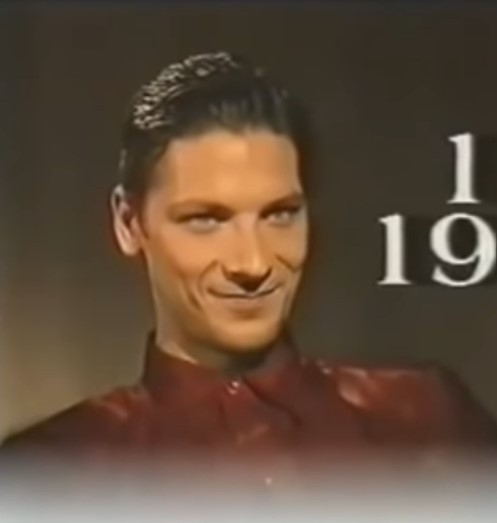
Friend of mine just said that this pic of Schneider makes him look like "the Devil's drag persona."
#ven speaks#christoph schneider#rammstein#viva jam interview 1997#viva jam 1997#schneider#he's still hot but....yeah
70 notes
·
View notes
Text
Feature Interview with P.R. Brown
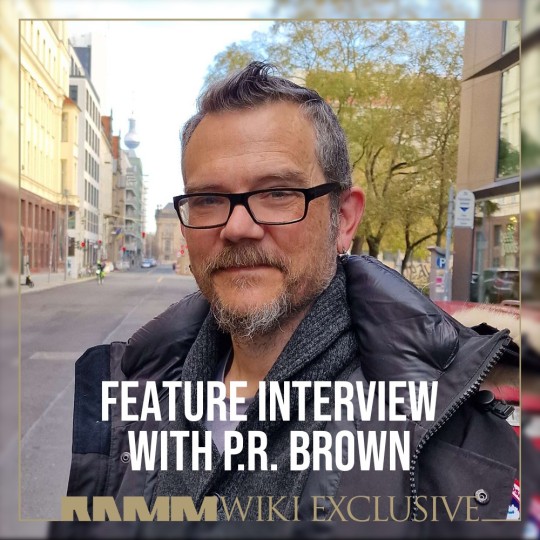
P.R. Brown has designed multiple Rammstein single covers, done two major photoshoots for the band, directed two Emigrate music videos, and photographed Rammstein live. In this feature interview by KidArctica, the Grammy nominated director and photographer talks about a steamy Emigrate video shoot, horseshit, a Rammstein run-in with the New York mafia, Schneider losing it, and about getting naked with the band.
44 notes
·
View notes
Note
Ben Daniels is having a serious Till Lindemann moment and I'm living for it!
You know I have been thinking the same thing!!!

(Couldn’t find a gif with the costume that is eerily similar in my memory, but yes!)
24 notes
·
View notes
Text
Loudersound interview with Schneider, 2020
18 notes
·
View notes
Text




Interview: RZK talks new Emigrate album & Rammstein
[aesthetic: Richard being enthusiastic about the things he loves and cares about, in this case guitar tech 🤍]
#my FAVOURITE interview of all time#he's so happy and enthusiastic during it and you can really feel how glad he is that he can talk about this stuff#also: vampire daddy vibes from that outfit#again making gifs solely for that purpose to cater to my own rzk needs#rammstein#richard kruspe#rzk
153 notes
·
View notes
Text
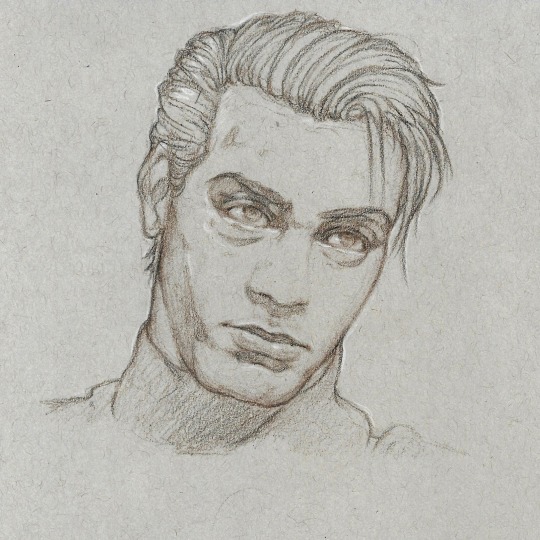
till 1997
158 notes
·
View notes
Text
90 notes
·
View notes
Text
youtube
Blixa Bargeld Amusing Clips
#blixa bargeld#amusing#german#interview#questions#language#translation#nick cave#not comedy#rammstein#einstürzende neubauten
3 notes
·
View notes
Photo
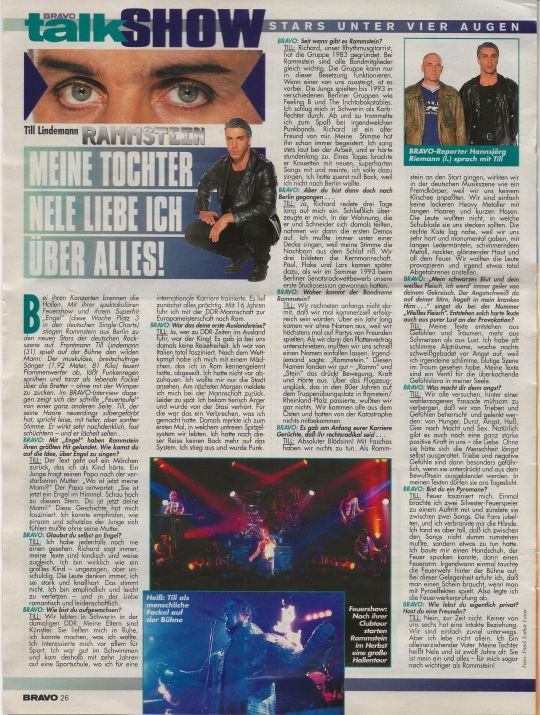
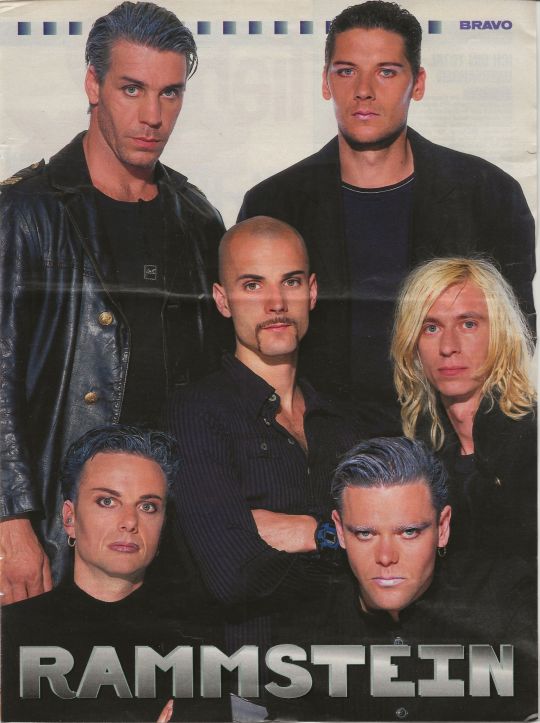
Bravo 05.06.1997, interview with Till
The halls burn at their concerts. With their spectacular fire show and their super hit 'Engel' (this week number 3 in the German single charts), Rammstein from Berlin rose to become the new stars of the German rock scene. Frontman Till Lindemann plays the wild man on stage: The muscular, broad-shouldered singer fires flamethrowers, lets showers of sparks spray and dances across the stage as a living torch - without batting an eyelid. In the BRAVO interview, on the other hand, the shrill 'fire devil' shows a completely different side. Till, who has recently dyed his hair silver, speaks softly, in a deep but gentle voice. He seems very thoughtful, almost shy — and he rarely smiles...
Rammstein landed their biggest hit with 'Engel'. How did you get the idea to sing about angels?
The text goes back to a fairy tale I heard as a child. A boy asks his dad about his deceased mother: "Where is my mommy now? » The dad replies: «She is now an angel in heaven. Look up at that star. There's your mommy now! » This story fascinated me. I could sense how lonely and vulnerable the boy must have felt without his mother.
Do you believe in angels yourself?
Anyway, I've never seen one. Richard always says my lyrics are childish and wise at the same time. I really am like a big kid — naughty but innocent. People always think I'm strong and badass. That's not true. I am sensitive and easily hurt — and romantic and passionate in love.
How did you grow up?
We lived in Schwerin in what was then East Germany. My parents are artists. They left me alone, I could do whatever I wanted. I was mainly interested in sports. I was good at swimming, so when I was ten I went to a sports school where I trained for an international career. At first everything went great. When I was 16, I went to Rome with the East German team for the European Championships.
Was that your first trip abroad?
Yes, anyone who went abroad in GDR times was king! We didn't have the freedom to travel back then. I was totally fascinated by Italy. After the competition I abseiled with a girl I met in Rome. I had no intention of running. The next morning I reported back to the team. Unfortunately too late. I got into big trouble and was interrogated by the Stasi. What I did was a crime for them. It was then that I noticed for the first time in what a slave system we lived in. After this trip, I was fed up with the system. I got out and became punk.
How long has Rammstein existed?
Richard, our rhythm guitarist, founded the group in 1993. At Rammstein all band members are equally important. The group can only function with this cast. If one of us gets out, it's over. The guys played in various Berlin groups like Feeling B and The Instabokatables until 1993. I got by in Schwerin as a basket weaver. From time to time I played drums in some punk bands for fun. Richard is an old friend of mine. My voice has always fascinated him. I used to sing out loud at work and he would listen for hours. One day he brought cassettes with new, super hard songs and told me to sing along. At first I didn't feel like it because I didn't want to go to Berlin.
But then you went to Berlin after all...
Yes, Richard talked to me for three days. Finally he convinced me. We then recorded the first demos in the apartment he and Schneider shared at the time. I always had to sing under a blanket because my voice woke the neighbors from their sleep. The three of us formed the core team. Paul, Flake and Olli came later when we won our first studio session at the Berlin Senate Rock Competition in the summer of 1993.
Where does the band name Rammstein come from?
At first we didn't expect to be commercially successful. For over a year we went without a name because we only played at friends' parties. When we signed the record deal, we had to come up with a name quickly. Someone said: "Rammstein. » We liked this name — «Ramm» and «Stein» express movement, strength and hardness. We knew nothing at all about the plane crash that happened in the 1980s at the military training area in Ramstein/Rhineland-Palatinate. We all come from the east and didn't notice anything about the catastrophe.
At the beginning of your career there were rumors that you were right-wing extremists...
Absolute nonsense! We have nothing to do with fascists. When Rammstein started, we seemed like a foreign body in the German music scene because we didn't conform to any cliché. We're just not easy-going heave metallers with long hair and short pants. People didn't know which box to put us in. The box on the right was obvious because we acted very tough and monumental, with long leather coats, shimmering metal, bare shiny skin and all that fire. We wanted to provoke people and do something totally crazy.
« Mein schwarzes Blut und dein weißes Fleisch, ich werd’ immer geiler von deinem Gekreisch. Der Angstschweiß da auf deiner Stirn, hagelt in mein krankes Hirn… » you sing on the number 'Weißes Fleisch'. Are such harsh texts also created out of sheer desire to provoke?
My texts arise from feelings and dreams, more from pain than from pleasure. I often have bad nightmares, waking up at night drenched in sweat from fear because I saw some bad bloody scene in my dream. My lyrics are an outlet for the emotional lava boiling over in my soul.
What scares you?
We all try hard to hide behind a well-mannered facade that we are ruled and guided by drives and feelings: by hunger, thirst, fear, hatred, greed for power and sex. Of course there is also a very strong positive force in us - love. Without them, humanity would have exterminated itself long ago. Drives and negative feelings are particularly dangerous when they are suppressed and hidden from consciousness. In my texts they are allowed to come into the open.
Are you a pyromaniac?
Fire fascinates me. I once brought two New Year's Eve fire breathers to a gig and lit them between songs. The fans cheered and I burned my hands. But I thought it was great that I didn't have to stand around stupidly between the songs, but had something to do. I made myself a gauntlet that could spit fire, then a fire arm. At one point, the fire department showed up behind the stage. On this occasion I learned that you need a ticket to play with pyro effects. So I took the firework exam.
How do you actually live privately? Do you have a girlfriend?
No, not at this time. None of the six of us have an intact relationship. We're just too much on the go. But I don't live alone. I am single father. My daughter's name is Nele and she's twelve years old: she's my everything - for me even more important than Rammstein!
#Rammstein#Till Lindemann#Richard Kruspe#Paul Landers#Christoph Schneider#Flake#Oliver Riedel#1996#interview#translation#*scans#*
70 notes
·
View notes